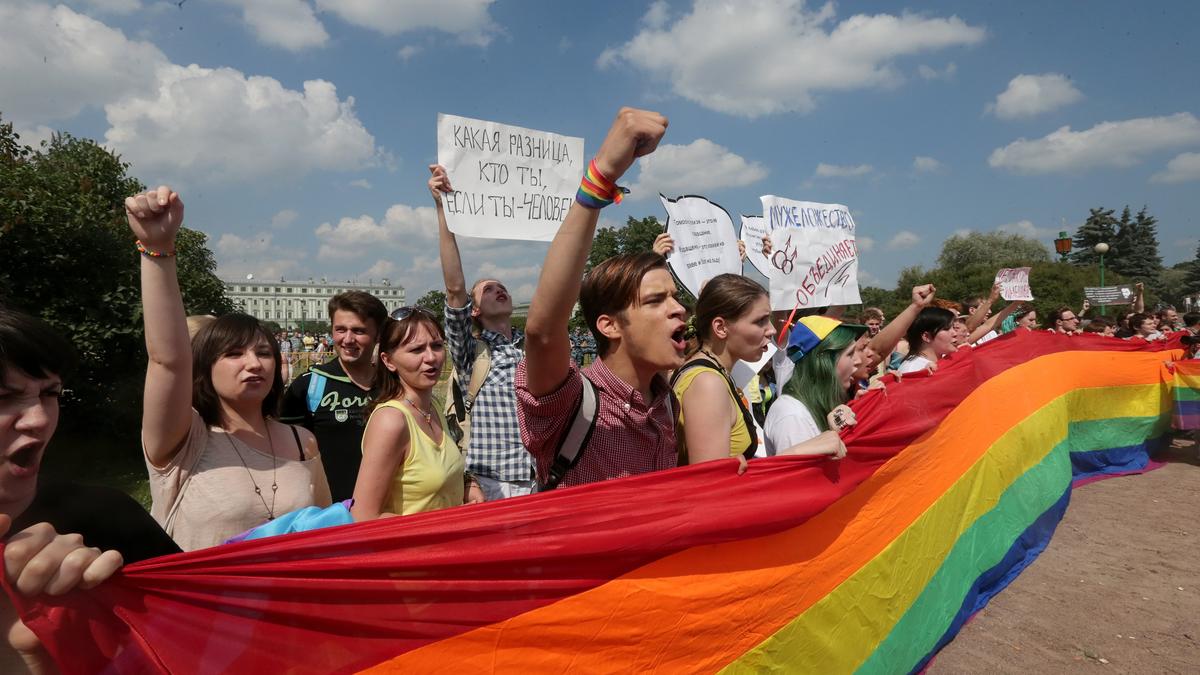When Pride first arrived in Russia in the early 2000s, its events tended to be more mass brawl than celebratory march with balloons and banners. Russian conservatives and even the state itself rejected the idea of equal rights at the most fundamental level, the culmination of which would be the Russian Supreme Court declaring the so-called “international LGBT movement” extremist in November.
The mayor, the church and Oscar Wilde’s grandson
Moscow gays and lesbians first made a show of strength 19 years ago, forming a small column of about 20 people and unfurling rainbow flags at an anti-fascist march in Moscow in December 2005. Shortly beforehand, the organisers had formed a Moscow gay pride committee, with a view to holding Russia’s first ever pride event the following year.
That spring, they applied to the Moscow Mayor’s office for a permit, proposing the parade take the same route as the previous year’s anti-fascist protest, but their application was rejected.
Moscow’s then-mayor Yury Luzhkov personally ensured there would be no gay parades in Moscow as long as he was in charge, a stance that was enthusiastically supported by Patriarch Alexy II, then head of the Russian Orthodox Church, as well as Russian nationalists and other concerned citizens.
According to one opinion poll conducted at the time, 77% of respondents approved of the ban. But the activists refused to give up and decided to proceed in secret with the march despite being refused a permit.
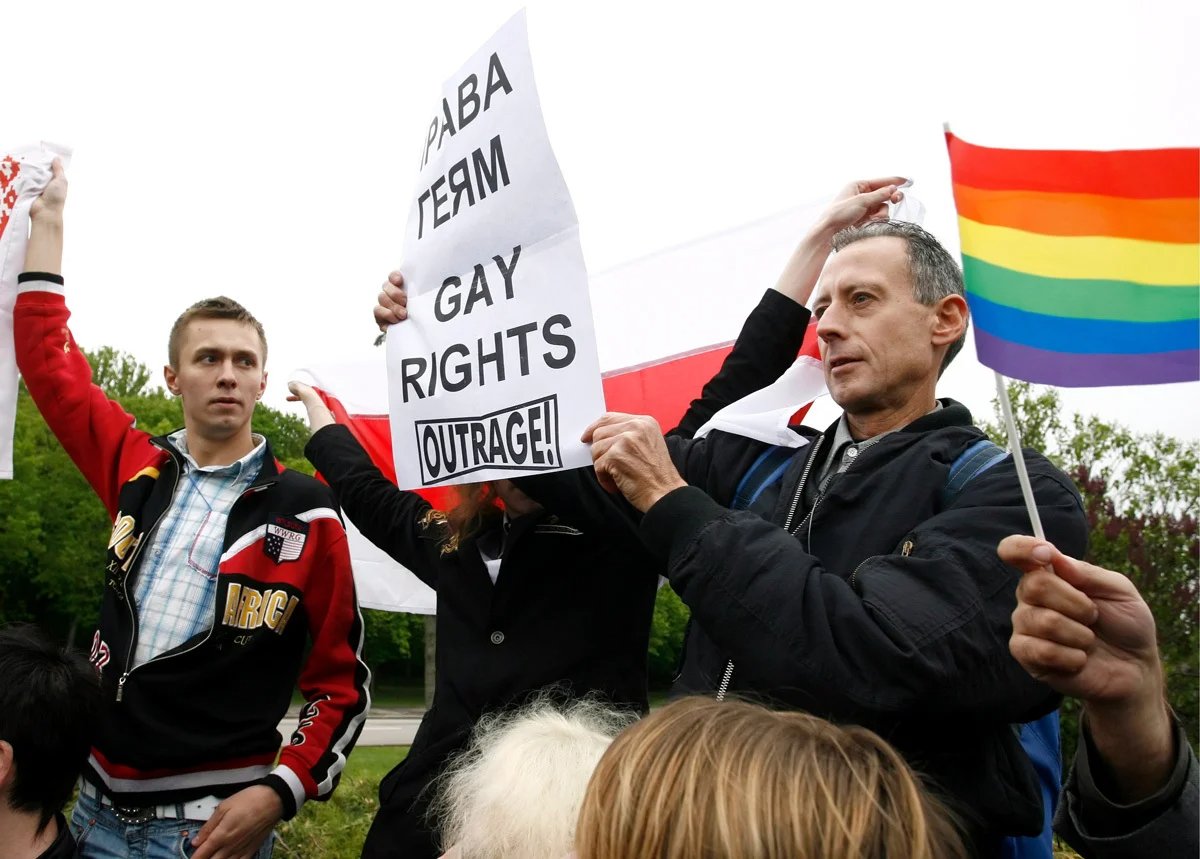
Veteran Australian gay rights campaigner Peter Tatchell joins Russian activists during an attempt to hold a Pride march in Moscow on 16 May 2009. Photo: Igor Kharitonov / EPA
Despite trying their best to keep their plans under wraps, on the day itself, the marchers were met with a heavy police presence, while various conservative and neo-Nazi groups looked on. When the marchers attempted to lay flowers at the Tomb of the Unknown Soldier, a mass brawl broke out and multiple arrests were made. Meanwhile, far-right radicals and Orthodox activists ransacked two gay clubs in the city and threw eggs at Merlin Holland, the grandson of Oscar Wilde, who had come to lend his support.
Activists made further attempts to celebrate gay pride in years that followed, applying to hold a parade in a number of different cities, though always without success. The authorities consistently denied them their right to peaceful assembly, citing “security concerns”.
Nikolay Alekseyev, a lawyer and the founder of GayRussia.Ru, an LGBT rights organisation based in Moscow, was invariably the brains behind such applications. Alekseyev tried 164 times to obtain permission to hold a Pride event, never once receiving a positive response. He challenged the results in the courts, eventually taking his complaints all the way to the European Court of Human Rights (ECHR).
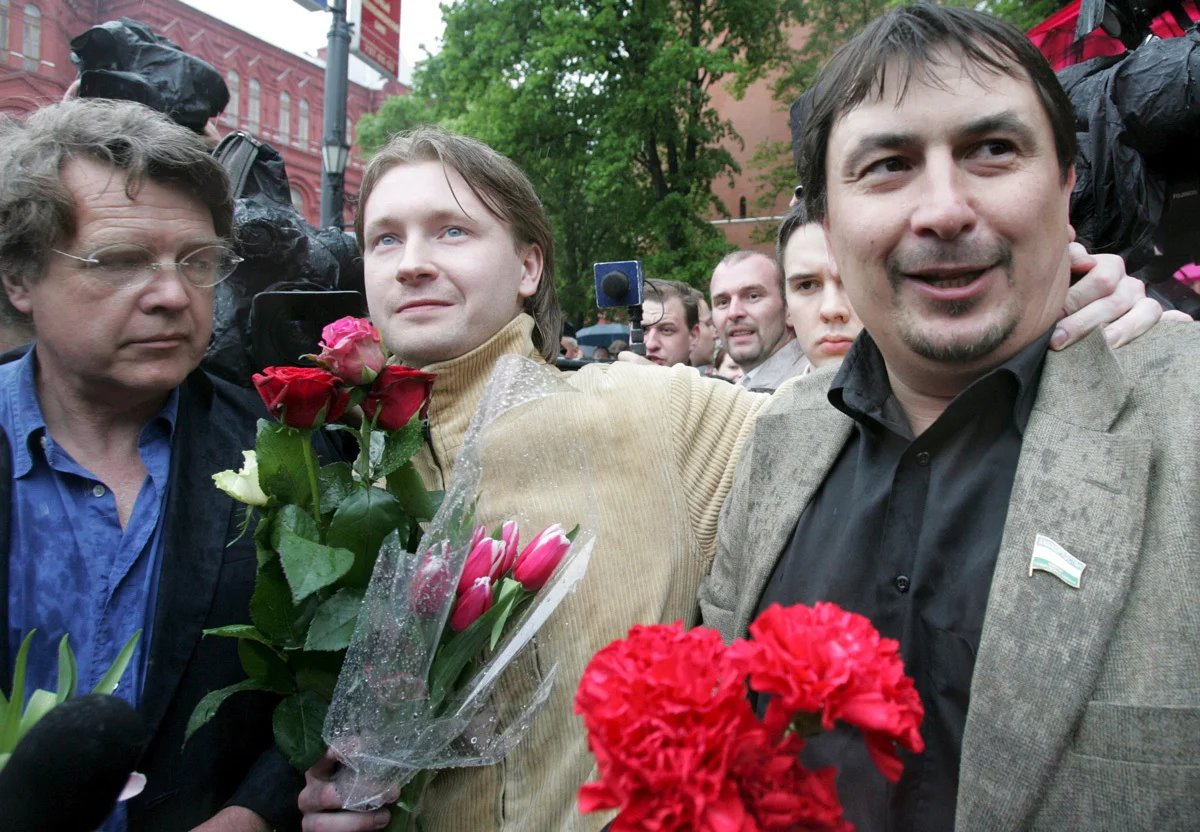
Flower-bearing marchers at a gay parade embrace outside the Kremlin, 27 May 2006. Photo: Sergey Chirikov / EPA
The ECHR declared Moscow’s ban on gay parades illegal in 2010, saying that it violated at least three articles of the European Convention on Human Rights. But that didn’t solve the problem for the activists.
While the Moscow authorities continued to refuse to grant permission for a Pride event to take place, LGBT activists made their presence felt elsewhere, such as at a 2012 rally against discrimination which Russian media at the time dubbed the first legal Pride parade in Russia. That June, a Moscow court banned such events for the next century in the name of “preserving public order”.
Nonetheless, some Moscow queer activists insist their work was not in vain, and continue to believe that sexual minorities managed to connect with Russian mainstream society during that time.
Slavic Gay Pride
Alexander Khots, a blogger and activist from the city of Tula in central Russia, recalls the secret gay parades of the 2000s, for which he began travelling to Moscow in 2007.
“I came to Moscow for Pride every year. We would march under a banner saying ‘Equal rights, no compromise’. In 2009, Moscow hosted Slavic Gay Pride, which I remember well. About 15–20 people came from Belarus to join us. We pretended it was a wedding. Alekseyev was the groom and the bride was a trans woman from Belarus.”
“We rented a bus and went to Sparrow Hills. The whole area was cordoned off and the police stopped us. The bus driver said: ‘It’s a wedding, I’m transporting the bride and groom,’ and the cops answered: ‘Like hell it is!’ and called for back-up.”
“We ran off the bus and headed towards Moscow State University where we raised rainbow flags and began chanting Pride slogans. The press got there before everyone was detained, but then the riot police turned up and we were detained and put in police vans.”
“There’s a famous photo of riot police dragging Alekseyev by his arms and legs in his suit. A riot policeman grabbed me too and kept asking: ‘Why don’t you just stay at home?’ That was perhaps one of our most successful events.”
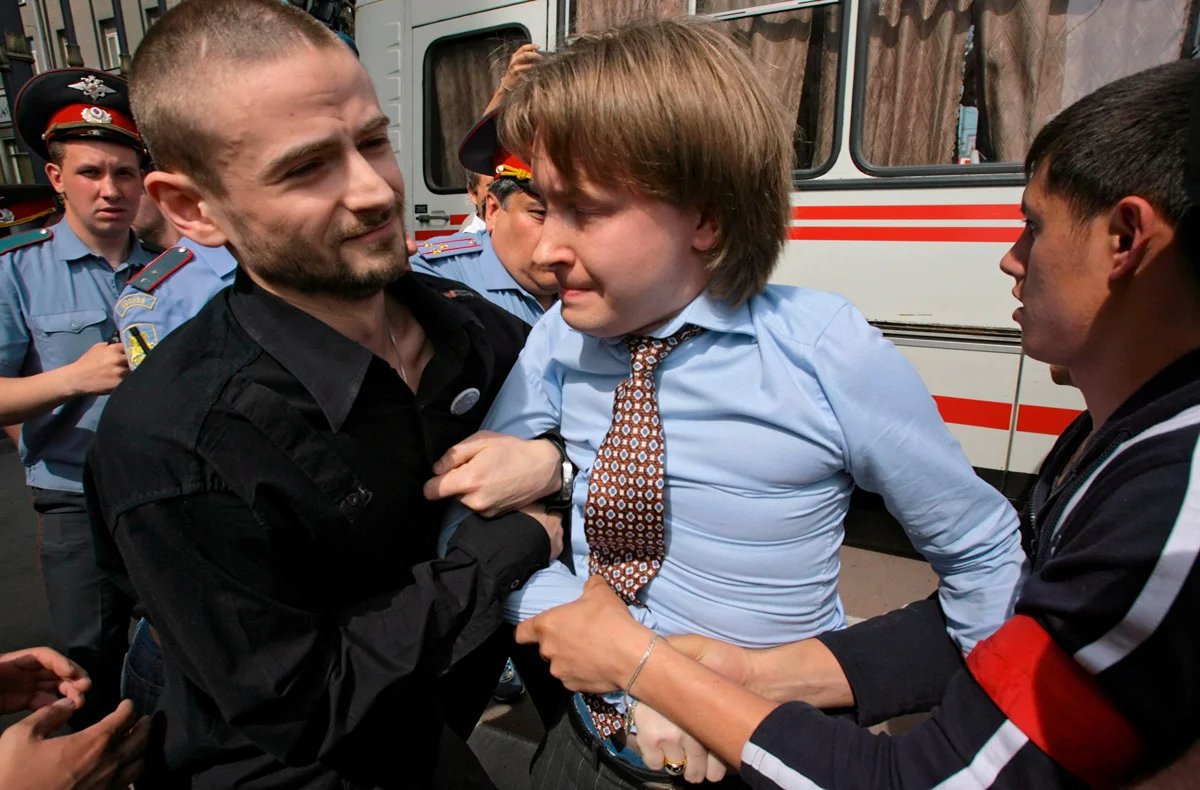
Police detain Nikolay Alekseyev near the mayor’s office, Moscow, 27 May 2007. Photo: Sergey Ilnitsky / EPA
Moscow’s homosexual-in-chief
The Russian tabloid press, which got good copy from covering Moscow’s more in-your-face gay and lesbian events, began to refer to Alekseyev as the leader of Russia’s LGBT movement and even dubbed him Moscow’s homosexual-in-chief. Astonishingly, in 2011, Alekseyev was invited to appear on pro-Kremlin channel NTV and was allowed to debate with propagandist-in-chief Vladimir Solovyov and State Duma Deputy Alexander Khinshtein, a scenario that would be unthinkable today.
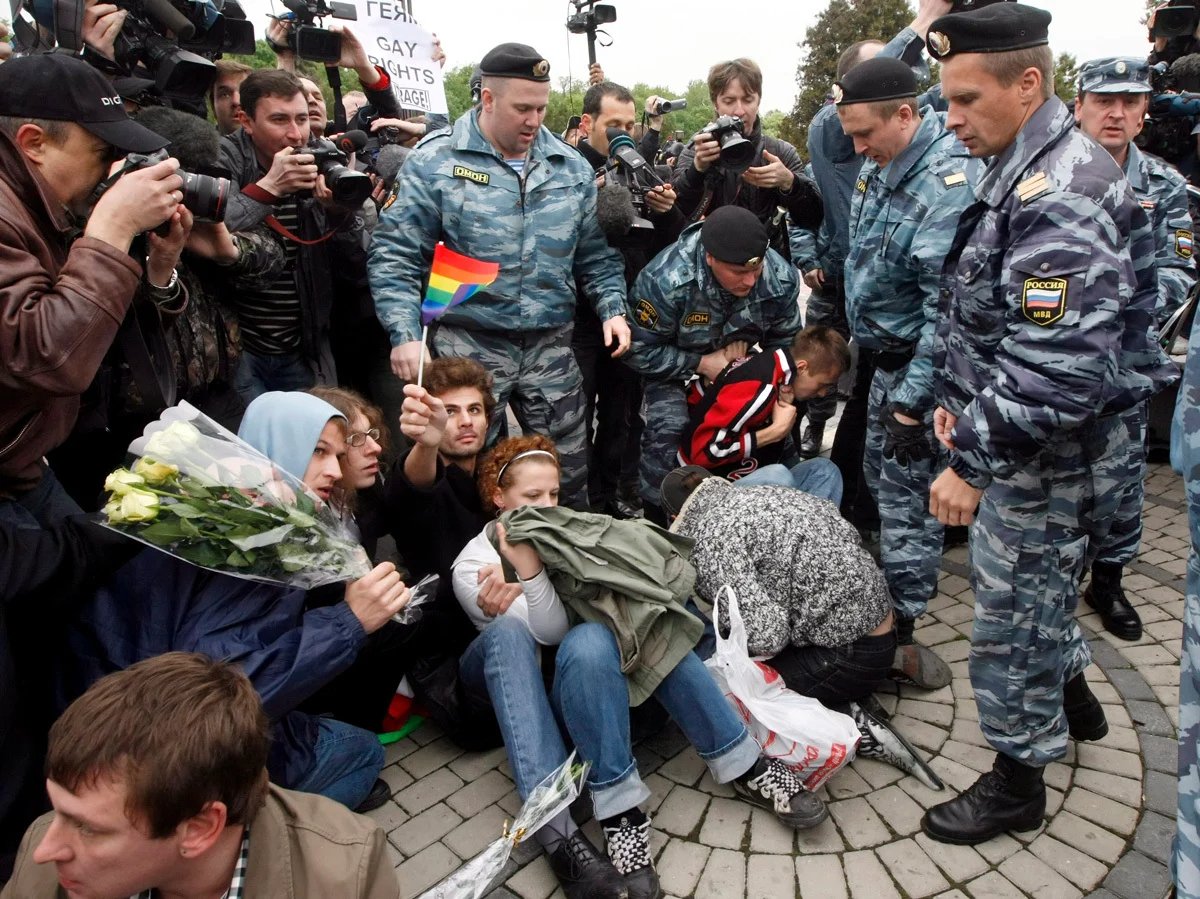
Riot police detain gay rights activists at a Pride rally in Moscow, 16 May 2009. Photo: Sergey Chirikov / EPA
But it was far from plain sailing for Alekseyev, and rifts within the queer community over his provocative and vocal approach began to appear. As far back as 2006, a group of LGBT activists accused Alekseyev of misleading politicians and his fellow activists, calling his intention to host a gay parade in Moscow untimely and dangerous.
As recently as 2019, Vitaly Bespalov, the editor-in-chief of Parni+, a Russian LGBT website, eviscerated Alekseyev in a stinging ad hominem online attack, accusing him of making the lives of people within the queer community more difficult and implying that he had made money from the ECHR while doing so.
Despite the criticism and the growing schism within the Russian LGBT movement , Alekseyev continued his attempts to grab the country’s attention and to keep LGBT rights in the headlines. According to Khots, though, Alekseyev’s divisive political views — he proved to be a vocal supporter of Russia’s illegal 2014 annexation of Crimea and called it “a lesson in democracy” that “Russia had gifted the West” — were soon driving a further wedge between the movement’s main factions.
“The annexation of Crimea split the Russian gay community in a number of ways,” says Khots, who remembers telling Alekseyev that by definition an activist and human rights defender could not support a violation of international law, to which he says Alekseyev replied by arguing that Crimea was “the jewel in the crown of the Russian Empire”.
“After that, we stopped speaking. While I’d say that Moscow Pride was unable to withstand the pressures of Russian imperialism, I do think there’ll be a need for it again in the future as part of the democratic changes that will inevitably come to Russia,” says Khots.
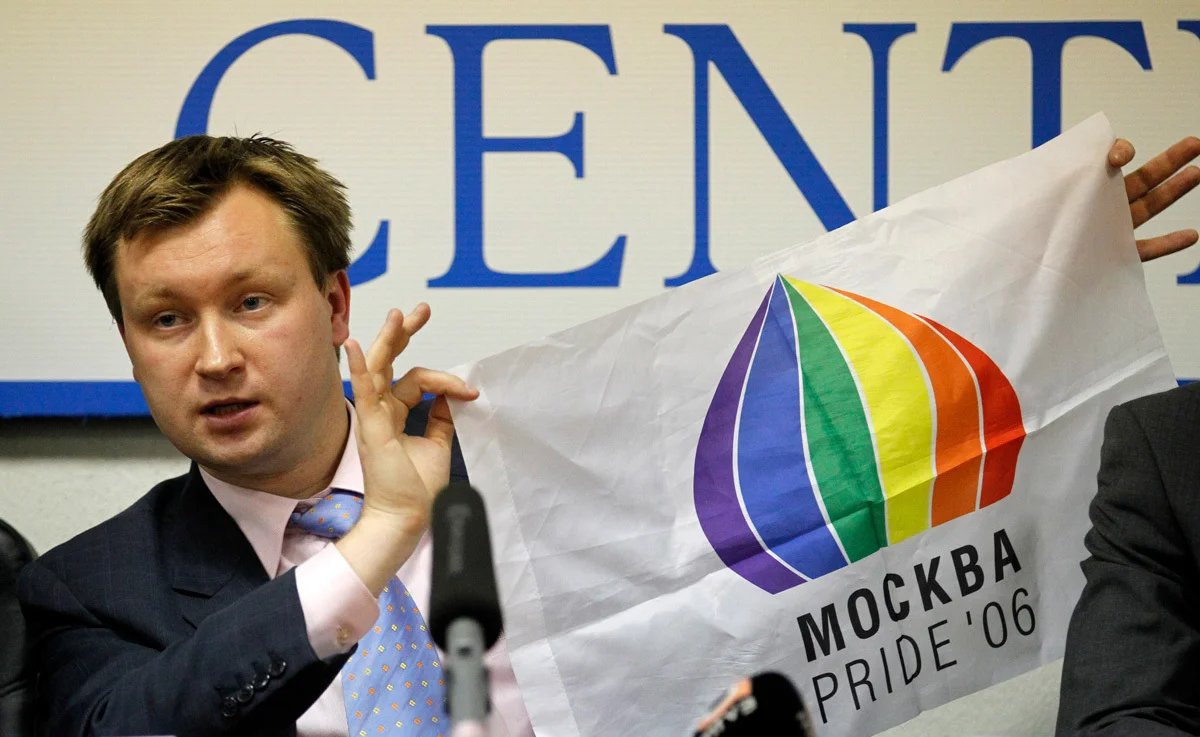
Nikolay Alekseyev, chief organiser of Moscow Pride, holds a flag at a press conference in Moscow, 21 October 2010. Photo: Tatyana Makeyeva / Reuters / Scanpix / LETA
‘They stopped just ignoring us’
Human rights activist Igor Kochetkov, the founder of the Russian LGBT Network, is also critical of Alekseyev, and stresses that during the early days of gay activism it was actually long and painstaking lobbying work conducted in tandem with both the state and society that was necessary, rather than just attention-grabbing events, though he concedes that both strategies had a role to play.
“The movement to promote LGBT rights in Russia was embryonic in the 2000s, which led to lots of discussion, which was useful. Where we disagreed was on strategy.”
The rights of sexual minorities have now become firmly embedded in Russia’s fight for universal human rights, despite the legal restrictions currently faced by the LGBT community in Russia, Kochetkov believes.
“Alekseyev and his supporters believed they could achieve quick, visible results, such as same-sex marriage and anti-discrimination legislation, with high-profile speeches and through international institutions such as the ECHR exerting direct pressure on the Russian authorities,” Kochetkov recalls.
“Our position was that there were no quick fixes and there was a need to take a long-term view, … rather than just causing a stir. As is so often the case when it comes to competing strategies discussions, both sides were right. We understood that the Russian authorities were unwilling to embrace change when it came to the LGBT community, but the public activity did have an effect — the authorities did stop just ignoring us.”
The rights of sexual minorities have now become firmly embedded in Russia’s fight for universal human rights, despite the legal restrictions currently faced by the LGBT community in Russia, Kochetkov believes, and can’t envisage the Kremlin succeeding in its attempt to subordinate public opinion on the issue given the scale of societal change over the past 20 years.
“I’m not sure that current state policy will lead to an increase in everyday homophobia. I may be wrong, but I see no obvious signs. Over the past 20 years, we’ve managed to change society, even if we’ve yet to change the state.”
We were unable to make contact with Nikolay Alekseyev while writing this article.
